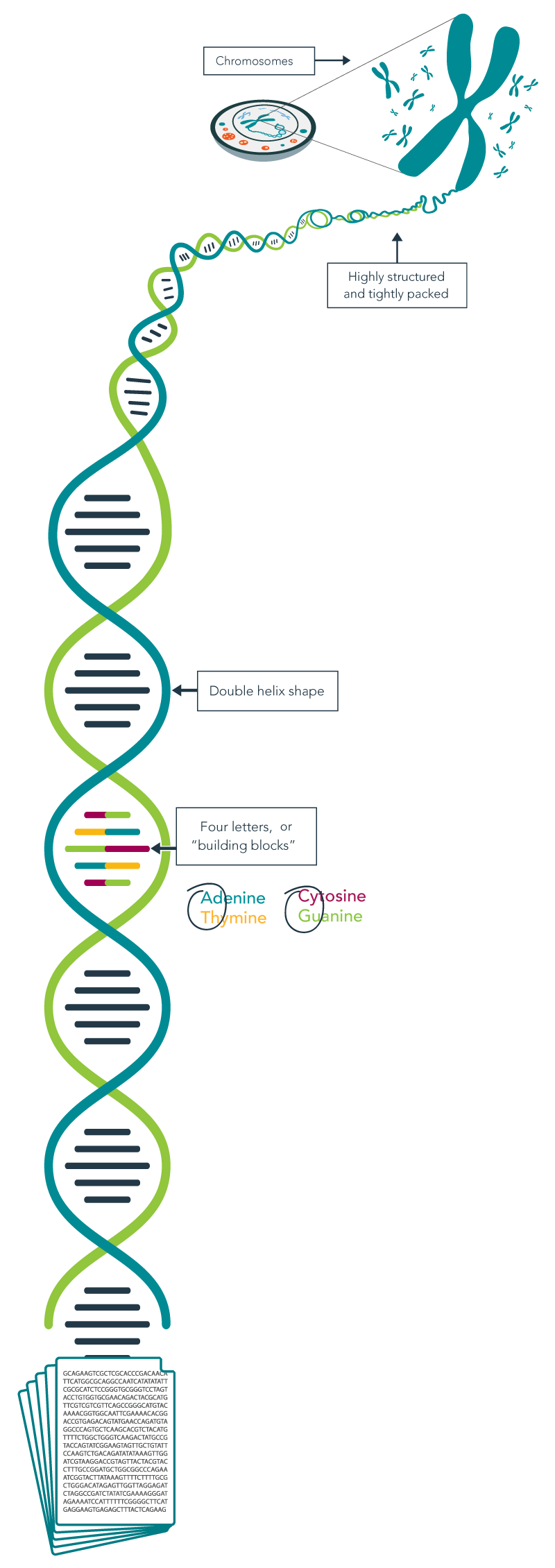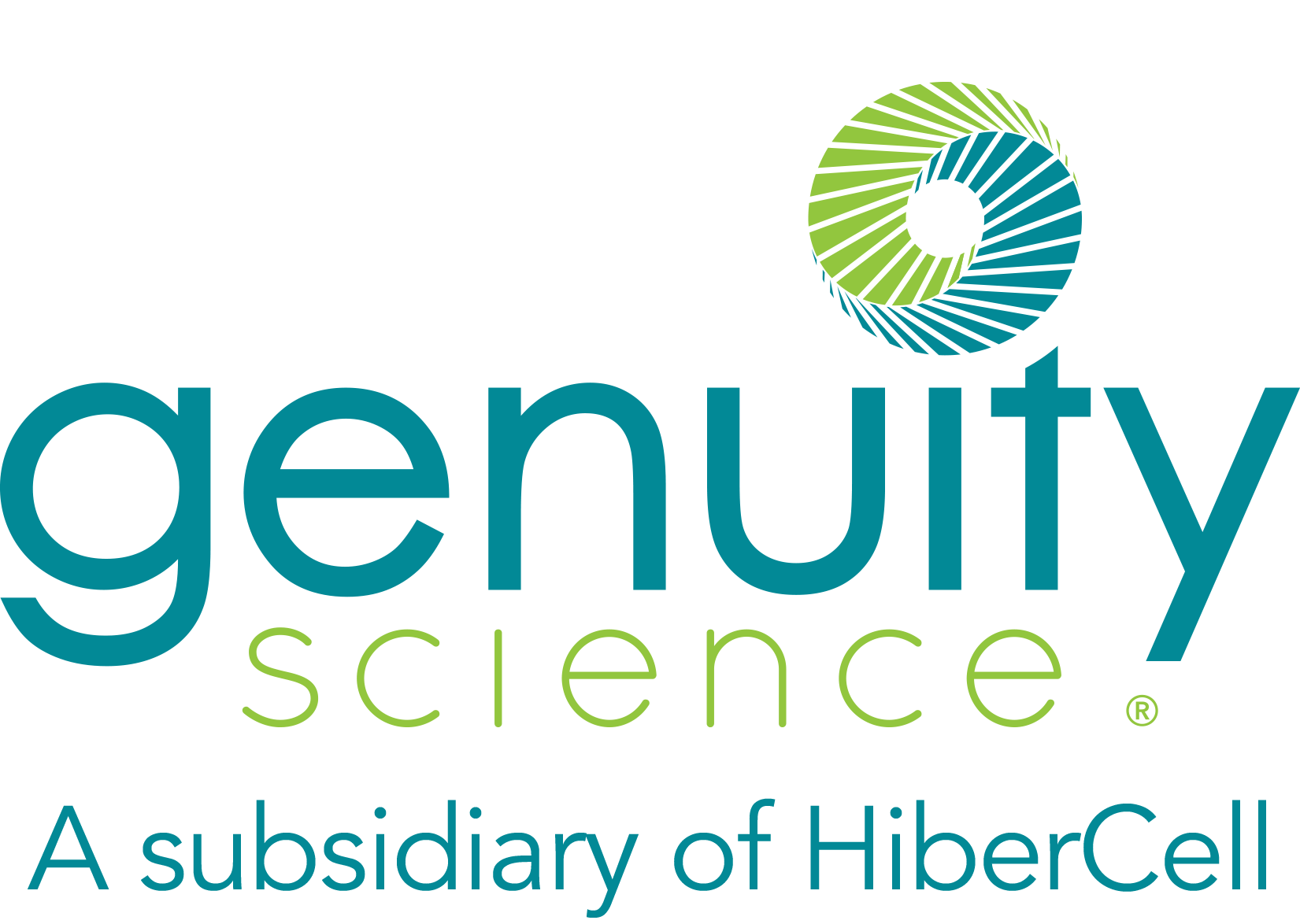A short guide to genomics research
Genomics is the study of a person’s entire set of genes (the genome) and how those genes interact with each other and the persons environment.
Your genome refers to all the DNA in your body. It is like a blueprint or instruction manual that provides the information needed to make you, run you and repair you.
The DNA in your genome is made up of 3.2 billion letters and contains around 20,500 genes. Genes are strands of DNA of varying length and are the genetic material inherited from your parents. They carry the information that determines your traits or characteristics.
Genes only make up about 1-5% of your genome. The remaining DNA found between the genes is also important as it is thought to be responsible for regulating the genes and the genome by switching genes on and off as needed. While we know a lot about the human genome, there is still a lot we are trying to figure out. Genomics is proving to be a revolutionary science for researchers who are working to develop a deeper understanding of how our genome is related to our health and risk for developing disease.
DNA (Deoxyribose Nucleic Acid) is a molecule that makes up the genetic code or sequence that determines all the characteristics of a living thing. Essentially, your DNA is what makes you, the unique individual that you are!
DNA molecules are made of two twisting, paired strands, often referred to as a double helix. This double helix is made up of four repeating units known as bases or nucleotides. These 4 letters are repeated multiple times in a particular order that is unique to you. No matter what the order of the letters is;
![]()
The DNA double helix coils round and round into a tightly packed structure called a CHROMOSOME! In almost every cell of your body you have 23 pairs of chromosomes. You received 23 chromosomes from your mum and 23 from your dad. Each chromosome contains up to 25000 genes.
It’s the specific order of A, T, C and G within a DNA molecule that is unique to you and gives you your characteristics. Nobody else in the world will have DNA the same as you (unless you have an identical twin).
Amino acids are tiny chemicals inside our body and are often referred to as the building blocks of human life. They have the very important job of making proteins. These proteins along with other chemicals instruct the body to make living cells. Cells group together to make tissues; tissues group together to make organs and organs, each with its own specific function, when put together, combine to make humans . The unit of DNA that carries the instructions for making proteins is called a gene. If a cells DNA has a glitch (in scientific terms a mutation or variant) an abnormal protein may be produced which may lead to disease.
In 1990 scientists from around the world started to study the first full human genome. This became known as the Human Genome Project. It took 13 years and cost $2.7billion. Today, because of advances in technology, a genome can be studied (sequenced) in a few days for less than $1000.
Fun fact: the full human genome sequence fills over 260,000 pages!

What is driving us toward a more precision-based approach to healthcare?

There is currently
<15%
Probability of success for new drug trials

The average
Cost to develop a new drug
$2.7B
The top 10 drugs prescribed
in the US on average
work only for
1 in 12 people


12M (5%) ADULTS
in the US who attend outpatient care
RECEIVE INCORRECT DIAGNOSES
What is whole genomic sequencing and
why is it important for health research?
Whole genome sequencing (WGS) is a powerful technology used to read and analyse the genome.
Using this method, it is possible to read an individual’s entire DNA code which is equivalent to 500GBs of data! Before WGS it was only possible to analyse small pieces of the genome. DNA is extracted from a sample of blood and then put through a series of processes that converts the DNA into a readable sequence of digital letters. The sequence can then be analysed using very sophisticated technology.
Sequencing and studying DNA in this way can help us understand a lot about the human genome and how it relates to health and a person’s risk for developing disease. Research using WGS can also help predict how a disease progresses, an individual’s response to treatment and assist with the development of new treatments for conditions that are often incurable. Earlier detection and faster diagnoses will lead to faster, better informed and more targeted treatment decisions which, in turn, will improve patient outcomes and reduce healthcare costs. This is known as precision medicine and will ultimately lead to personalized healthcare.
How might your genomic makeup
impact your health?
Of the 3.2 billion bases that make up the human genome, there is an average of 4 million (0.125%) variants or changes found in each person’s DNA. This means that your genome is about 99.9% the same as everyone else’s but it’s that 0.1% difference that makes you unique.
Most of the time, these variants have no impact on a person’s health and may even be an advantage e.g. a person who has a particular variant that affects muscles may mean that person is extra strong! However, some variants may be linked to disease. Through our research studies, Genuity Science hopes to achieve a deeper understanding of how some of these disease-causing variants are impacting disease.
